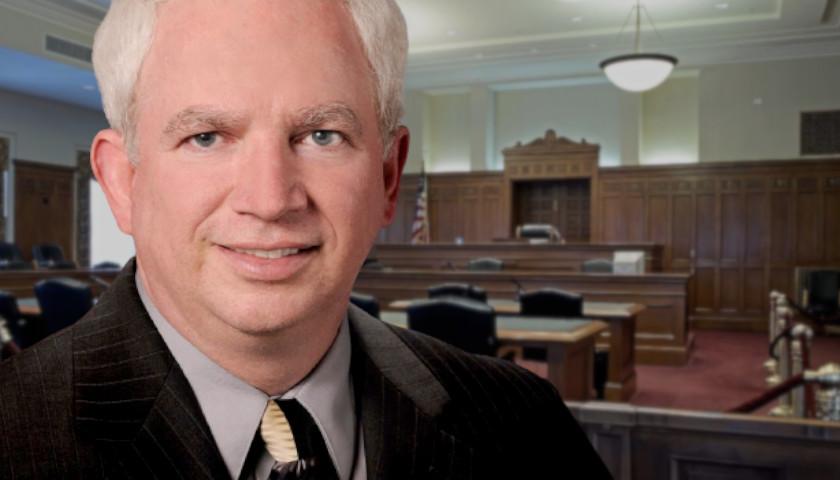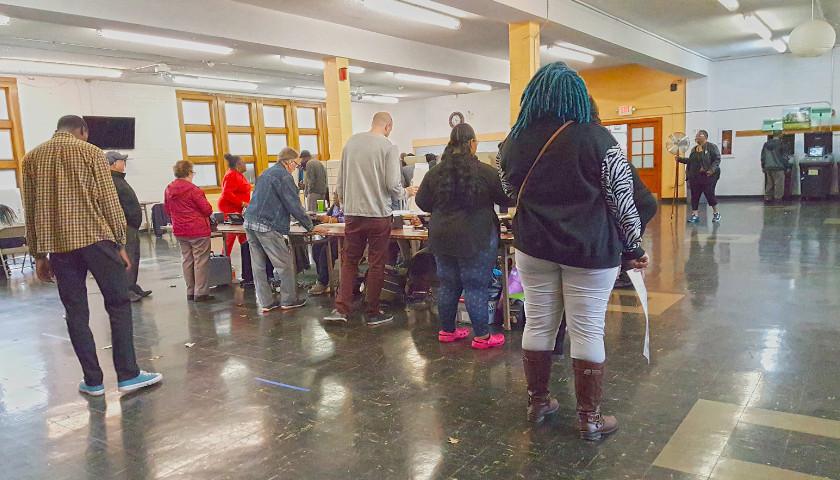The disbarment trial of former President Donald Trump’s previous attorney and constitutional legal scholar, John Eastman, wrapped up on Friday, the 33rd day. California Bar Disciplinary Judge Yvette Roland found him “culpable” on Thursday and gave his attorneys and the State Bar of California until November 22 to submit written closing statements.
The parties presented aggravating and mitigating testimony on Thursday and Friday, which Roland will use to consider whether to fully disbar Eastman.
Ryan Williams, president of the Claremont Institute, where Eastman is founding director of the Center for Constitutional Jurisprudence and a senior fellow, told The Arizona Sun Times, “All concerned citizens, lawmakers, jurists, and activists should regard this unprecedented disbarment trial with extreme alarm. We are quickly drawing down and perverting the sources of civilization and constitutional health. If we continue down this road, it will end very badly.”
Alex Haberbush of the Lex Rex Institute, one of Eastman’s attorneys, told The Sun Times, “It’s perplexing to attribute every complaint about the 2020 election to John Eastman, especially when similar claims were widespread among literally millions of others. The argument seems to be that, had Dr. Eastman not spotlighted the documented legal and procedural anomalies, citizens would not have raised issues with their elections officials — something OCTC seems to find objectionable. This belies a troubling aversion to the very accountability that a healthy republic requires of our public officials. Moreover, the implications of this proceeding extend beyond Eastman, posing a latent threat to citizens’ fundamental right to petition their government for redress of grievances.”
The California Bar’s attorney, Duncan Carling, put his witness, Justin Grimmer, back on the stand to continue aggravating testimony. He asked Grimmer to refute Eastman’s statement about extra votes being inserted into Georgia’s 2021 senate runoff election. Eastman said earlier in the trial, “Additional ballots kept being reported, but the 95 percent number didn’t change. The only way that happens is if you’re increasing the denominator at the same time or same rate as you’re increasing the numerator.”
Grimmer, who repeatedly had difficulty trying to explain his statistical analyses during testimony, produced a graph that showed the estimated vote count versus the actual vote count that evening. He said the change in the estimated vote count was reached well before it reached 80 percent. He did not address the number of votes increasing for each senate candidate.
Eastman’s attorney, Randy Miller, objected to that exhibit and others produced by Grimmer since he had not been provided them in advance. Roland, who contributed to Democrats while serving on the bench, dismissed his objections and allowed Grimmer to discuss them. Roland refused to allow the vast majority of Eastman’s exhibits into evidence while allowing the vast majority of the California Bar’s exhibits into evidence.
Grimmer spent a lengthy amount of time discussing the same topic he talked about on Thursday: why he didn’t believe there were vote spikes for Joe Biden in many large Democratic cities. He repeated the same reasons he provided the day before, mainly that they are heavily Democratic, so a lot of votes for Biden were expected. He did not explain why Biden would have received significantly more votes than Hillary Clinton did in 2016. Statistician Stanley Young refuted Grimmer’s claims earlier in the trial.
Next, Carling asked Grimmer about the Ryan Report, a letter from Pennsylvania legislators to Representative Scott Perry (R-PA-10) expressing concern that the Cast Vote Record in that state’s 2020 election showed that 3.1 million mail-in ballots were sent out, but only 2.7 million actually were. Grimmer said that’s “not what the data shows” based on his “analysis of the data file.”
Carling asked Grimmer about a declaration submitted in litigation by economist Charles Cicchetti that found 174,000 ballots illegally counted in Detroit since they did not have a registration number. Cicchetti determined that if the illegal votes were excluded, it would have resulted in 65,000 net votes for Trump. Cicchetti said he believed election workers may have run the same ballots through vote tabulators multiple times. Grimmer responded and said there was no evidence that election workers did that.
Another issue Carling went over again that he’d already spent a considerable amount of time on in previous days was a mistake made by accountant Bryan Geels, who said that around 60,000 minors registered to vote before they were eligible in Georgia. Geels found his mistake and corrected it to around 2,000 minors. Eastman said previously multiple times during his testimony that he was aware of the mistake and there was enough evidence of other illegal votes in Georgia that added up to more than the margin Biden won the state by.
Grimmer next discussed a finding regarding 873 deceased voters by Garland Favorito, co-founder of Voters Organized for Trusted Election Results in Georgia (VoterGA) and a retired IT professional with extensive experience with electronic voting machines and investigating election fraud in Georgia. Grimmer said almost all of the voters had voted early, then died, and were removed from the voter rolls a few days later. He did not explain why the elections employees were so diligent at immediately removing deceased voters in Georgia, considering there are significant problems around the rest of the country removing the names of deceased voters.
When asked about former Wisconsin Supreme Court Justice Michael Gableman’s concerns about inflated voter rolls in Wisconsin, Grimmer said there is no evidence there is a security risk due to these people who are deceased or who move out of state not being removed from the rolls. No papers have been written about it being a security risk.
Grimmer also claimed Gableman was incorrect when he said COVID-19 grants were directed primarily at large Democratic strongholds in the state. Grimmer said his team had researched and determined it wasn’t true, but he provided no evidence or statistics. Grimmer said he doesn’t believe Get Out the Vote (GOTV) efforts are partisan because many nonprofits are involved in those activities.
A former DOJ official emailed The Sun Times and expressed his disapproval of Grimmer’s technical testimony, stating, “The only issue relevant to a penalty would be did John rely on stats analysis that was patently substandard that only a negligent lawyer would rely on.”
After Grimmer finished, Miller asked to put on rebuttal testimony in response, but Roland refused to let him. Miller objected and said he’d mentioned bringing Eastman back on the stand “12 times” to rebut the aggravating testimony, but Roland refused and said she would only allow him to present mitigation testimony.
Carling brought back his witness, Bo Dul, former state elections director under then-Arizona Secretary of State Katie Hobbs, to testify next. She talked about receiving threats but admitted she could not recall a single threatening email that was sent to her and said she didn’t save any threatening emails or phone numbers.
Dul discussed a tweet she posted about shortly after the 2020 election. She said, “We didn’t need to waste millions of $ and months of election officials’ time, make AZ a laughing stock, incite vile threats against election officials, & do incalculable harm to public confidence in our democracy to know AZ’s election results were accurate.” She admitted there was no connection between Eastman’s actions and the threats. Eastman was not involved in any of Arizona’s 2020 election litigation.
During Miller’s turn to cross-examine Grimmer, he asked him how he knew there weren’t thousands of extra votes in the Pennsylvania election. He asked him about various aspects of election procedures, and Grimmer repeatedly responded that he didn’t know; he said he was unaware of how the state handled their canceled voter files, didn’t know the procedures regarding poll books when people come to vote, etc.
Jonathan Marks, deputy secretary for Elections and Commissions in Pennsylvania, testified for the California Bar about how his office had received threats. When asked what type of threats, he said that “they were being watched and would be subject to criminal penalties.” He admitted that Eastman had nothing to do with the threats and that he was not part of any of the “misinformation” regarding the 2020 Pennsylvania election.
The trial concluded with Carling confronting Eastman about remarks he’d made stating that the California Bar attorneys should be disbarred. Carling read previous comments by Eastman, “The bar’s complaint is so full of errors, I think the people who filed it should be disbarred for making false statements to a tribunal.”
Eastman responded and said he stood by the statement, although he acknowledged the bar counsel has immunity. He then gave an example to support his opinion. The California Bar claimed in its charges that Eastman made false statements when he said there were votes from deceased voters but then proceeded to agree that there were a few.
Carling asked Eastman about a fundraising letter his people sent out that said he was under “persecution by activist lawyers meant to get President Trump.” Eastman said that was accurate, noting that the States Democracy Center — which he pointed out was affiliated with Dul — filed complaints nationwide along with The 65 Project, whose stated mission is to disbar election challenge attorneys.
The trial ended by going over which exhibits were to be admitted, and there will be another hour next week just going over exhibits. Roland is expected to issue a written opinion shortly after closing briefs are submitted by November 22.
A source familiar with California Bar disciplinary proceedings told The Sun Times about appealing, “He has immediate access to the Review Department of the State Bar Court, which would transmit any recommended discipline to the California Supreme Court. Should he choose to appeal whatever recommendation the Review Department makes, it would also be to the California Supreme Court. It has plenary authority over attorney discipline and admissions. An appeal to the U.S. Supreme Court is also possible, but obviously limited by the caseload of the high court. It has taken several disciplinary cases over the last 50 years.”
– – –
Rachel Alexander is a reporter at The Arizona Sun Times and The Star News Network. Follow Rachel on Twitter / X. Email tips to [email protected].





